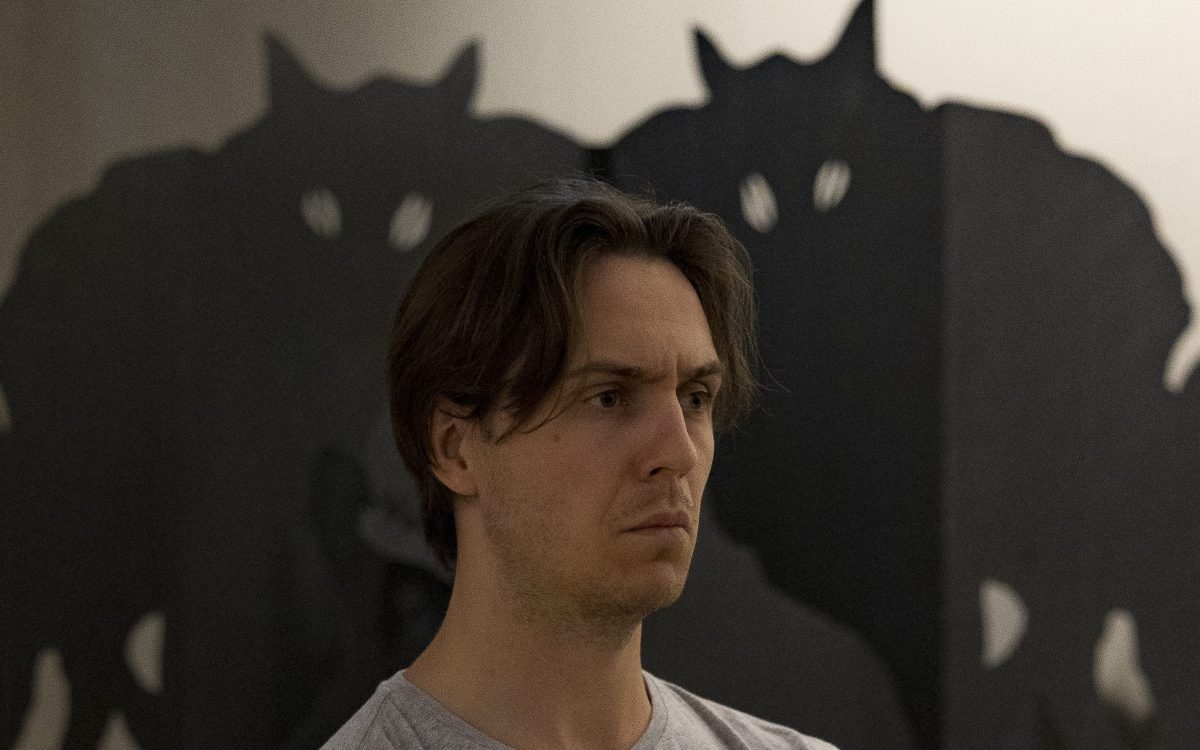The actors were on stage when we entered the theatre, greeting family and friends, talking to the audience. They were dressed in their street clothes and the set was minimal: a pile of black paper cut-outs of wolves, a graffitied wooden door frame tangled with vines. Wolves are Coming for You started in a similarly low-key fashion: the actors introduced themselves – Georgia Britt, Cameron Hutt, Riley McNamara – and thanked the tech team. The apparent casualness of the way this production was staged belied the confident playfulness of its interpretation.
Joel Horwood’s Wolves are Coming for You was a polyphonic piece of storytelling set in an English village over a 24-hour period. Each of the actors played three characters, whose lives intersected as they told the story of the day and night when wolves invaded their village. Drawing on oral storytelling traditions, the actors began by describing the village, using words and gestures to create a visual map for the audience.
We looked around the space, imagining that there was the Lewis farm – which has always been farmed by a Lewis – and over there was the creek, vicarage, school and town hall. And they introduced the characters, too. We met 14-year-old Ellen, who struggled with her weight; her controlling mother, Grace; the vicar and his wife, who was also Ellen’s teacher; a young outcast called Ida; Ferdy, a veteran who lived by himself in the caravan in the woods; and the elderly farmer Bea Lewis and her son Adrian, visiting her from the city.
Wolves used a kind of narrative baton passing technique to tell its story. Interlocking conversations between pairs of characters were used to create scenes, with each person’s version of the truth interweaving together to find space in a shared narrative.
The story began with an early morning wolf sighting by old Bea Lewis, who claimed to have seen the animal in the headlights of her son’s car. Adrian was sceptical and argued with his mother, who later sought solace from the village vicar. After disengaging himself from the pugnacious Bea, the vicar approached his wife for reassurance, but she was too busy marking and instead engaged her pupil Ellen in conversation.
Along the way each pair of characters vigorously debated ideas about good and evil, whether one is actively doing good or merely choosing niceness to avoid conflict, and whether, in fact, the wolves were real. At one point, teenaged Ellen suggested that the wolves have been bought online by a local drug dealing family and released into the village.
Wolves was about many things: fear of the outsider and, paradoxically, fear of oneself; the boundaries people erect between themselves and others; reputation, shame and social stigma; abuse of power; truth and authenticity. It could be variously read as a critique of right-wing politics, with its demonisation of the foreign or the unknown.
With wolves featuring prominently in many western European fairy tales, it could also be seen as a modern day fairy tale, where the “wolf at the door” becomes fear of a loss of control or identity. Or you could see the village characters as a kind of macro representation of the human psyche, where different desires, fears and inner narratives all battle for prominence. The structure of the text reflected its central message: we must all work together to overcome fear and prejudice.
Wolves was an incredibly funny piece of writing, with Hutt, in particular, achieving some remarkable comedic moments. His portrayal of the anxious, controlling Grace referenced Australian cultural icons Kath & Kim, but also slyly nodded towards national political figures. When outsider Ferdy approached Grace’s house with a peace offering of venison stew, Grace later reported this to the police officer as a ‘veiled threat of dead meat in a pot’. McNamara embodied the tough intransigence of the old farmer, Bea Lewis, while Britt captured the delightful exuberance and vulnerability of the teenaged Ellen.
With each actor playing three characters, some representations worked better than others, but overall this was a well-balanced production with excellent ensemble work and some very effective staging choices. During a sequence when the putative wolves were attacking the village, everyone crowded into the village hall and the police officer (McNamara) attempted a roll call. The house lights were flicked on at this point, with the audience becoming the villagers and names on the roll read from a list of ticket holders.
Read: Theatre review: Taking Liberty, WA Maritime Museum
It’s just one example of this production’s creative approach to audience engagement. Wolves are Coming for You was a skilfully delivered, smart and playful piece of storytelling by an exciting new theatre company. It was also a beautiful plea for understanding and compassion.
Wolves are Coming for You by Joel Horwood
Kittyhawk Theatre for Sydney Fringe
Emerging Artist Sharehouse/Erskinville Town Hall
Wolves are Coming for You was performed 26-30 September 2023 as part of Sydney Fringe Festival.





